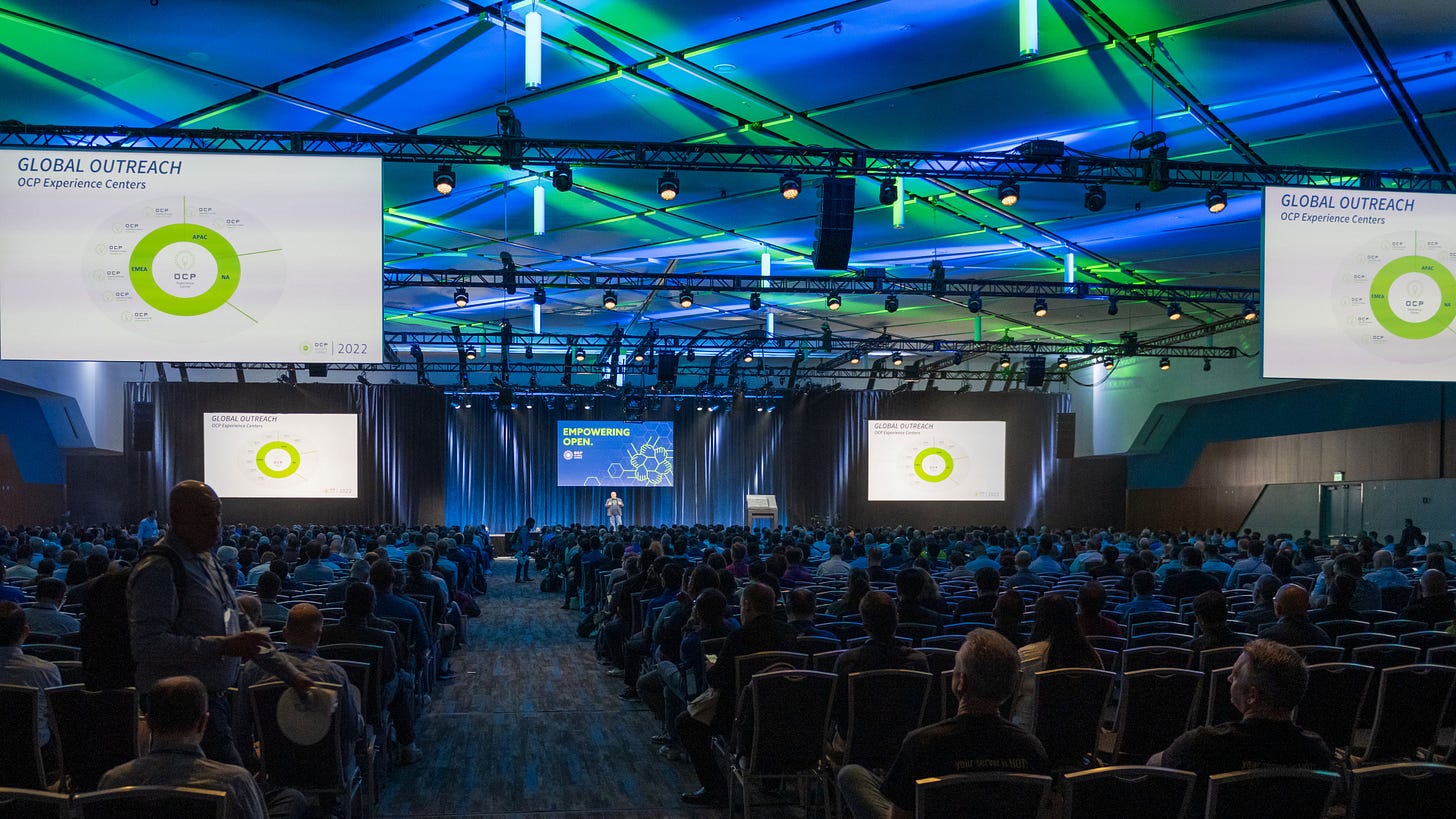OCP 2024: AI, NVIDIA, Data Centers, and Growth
How a major tech summit functions
On October 15, 2024, I attended the Open Compute Project's 2024 Global Summit as a media member. The Open Compute Project is a global organization founded by Meta with the express aim of increasing open computing collaboration for various tech companies in data management and for data centers. The purpose of open computing is to make non-essential and generalized technologies available to all companies, thus advancing innovation and evolution. OCP has several annual events, the biggest of which is the Global Summit, a meeting of some of the world's largest tech corporations and a place where major technologies are announced.
The first day opened with some significant announcements. Semiconductor-centered LinkedIn could talk about little more than AMD and Intel's collaboration, notably on x86 and much more. It is interesting to note that the two companies have a history of partnerships, but the circumstances are quite different at this time. Intel is clearly the weaker partner, something that likely deserves its own article some time or other. Overall, Intel seemed to be taking its place as a lesser company within the semiconductor pantheon throughout the conference. Their attempts to showcase their new receivers were botched by shoddy Wi-Fi connection (they had really nice staff and engineers, however), and there was more than a little talk about Intel's last few years in the AMD section whenever I went near it.
Speaking of the Wi-Fi, it was clear that the event organizers were overwhelmed by relatively high attendance. Parking was practically impossible to find, and food lines stretched on for quite some time. There were clear efforts to sort everything through, but it was clear that the event resources were overwhelmed.
Another critical announcement of interest was Meta's new Catalina software. Created to train LLMs using NVIDIA GPUs, Catalina was the talk of the summit, with lengthy lines to check out its features.
During lunch, individuals with media passes got to participate in a Q&A with the leaders of OCP. The Q&A and session were managed by CIO Cliff Grossener and featured CEO George Tcharipan, CTO Bijan Norwoozi, CMO Dick Van Slyke, Senior Director of Community Michael Schill, and Steve Helvie, VP of emerging markets. The mood in their segment was optimistic, highlighting major announcements from AMD/Intel and Meta. As the panelists noted, while the event's official theme was "From Ideas to Impact," growth was a crucial idea in everyone's mind. Fresh technologies and the rise of AI were key to the optimism, and open interface was a tool for that.
An interesting ideology drives the open computing project. CEO George Tcharparian framed the goal of OCP as inherently capitalistic and that open computing would increase the efficiency of the market as a whole while allowing the best ideas to succeed without the struggles of start-up costs and scalability, described as "cooperative competition."
Part of the reason for this optimism is NVIDIA. In many ways, OCP this year was all about NVIDIA. The event organizers mentioned NVIDIA's importance, AMD and Intel's alliance was tied to Jensen Huang, Meta clearly mentioned NVIDIA GPUs were used in Catalina, and the convention floor was filled with "NVIDIA partner" and "NVIDIA compliant" signs. One could feel NVIDIA's palpable sense of awe for attendees and companies. With AI becoming the talk of the town when it came to the data revolution, it was obvious that NVIDIA would have a great week, but it is hard to overstate just how omnipresent NVIDIA was.
That is not to say that other companies were absent. Tech giants such as AMD, Samsung, Applied Materials, Meta, and Seagate showcased their latest open computing tools for data centers. Intel proudly displayed its new PMT, Samsung showed off a range of new products, Seagate showed off its powerful new hard drive Mozaic, and AMD showcased its new CHIPS alliance cryptography security system, Caliptra 2.0, which theoretically can stop quantum hacking.
With the tech industry always attempting to showcase new inventions and disruptions, innovation was a key focus of the event. One of the critical segments of the floor was the 'Innovation Village,' where companies showed off their latest inventions. Despite being a little crowded, it was nonetheless quite an interesting idea.
Throughout the entire summit, new ideas were on everyone's mind. Whispers and murmurs of new disruptive technologies were all over the place as AI became a topic of the present rather than the future. There were multiple presentations dedicated to liquid cooling, which stood as one of the hot new innovations in everyone's mind. Additionally, there was some bubbling excitement for breakthroughs in quantum computing, potentially making an impact within the coming years. All of this was wrapped up in AI, and future ideas (quantum computing) and previous conference ideas (sustainability) took a far second billing to the AI revolution in data centers.
Overall, the OCP 2024 Global Summit was quite an enjoyable conference. It was sometimes a little crowded, but the excitement was palpable, and there was legitimate optimism for the future. AI technology and NVIDIA dominated the discussion, and data centers seemed ready for another revolution. The Open Compute Project seemed ready to expand even further, entering a new chapter of existence. As the need for data analytics grows and the tools required become more complex, open computing will become much more common.


